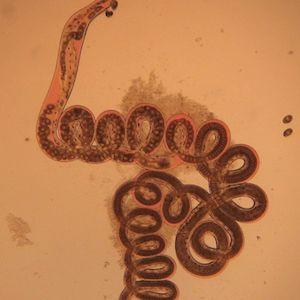Parasitic worms aren't all bad.
Parts of the world in which people are still regularly infected by them tend to have lower levels of autoimmune disease. This and other observations have led to the hygiene hypothesis, which posits that the ultra-clean, super-hygienic setting of the developed world may be responsible for the rise of chronic conditions such as allergies and asthma.
In theory, some health conditions that involve dysregulation of the immune system, especially out-of-control inflammation, might be treated by making the patient less hygienic. This, in turn, has led to helminth therapy, the purposeful infection of a patient with parasitic worms. To survive, some parasites "turn down" the host's immune response, and evidence suggests that helminth infection can help patients suffering from allergies, asthma, inflammatory bowel disease, multiple sclerosis, and type 1 diabetes.
Now, there is evidence that helminths could help treat obesity, a condition that also involves low-grade inflammation in fat (adipose) tissue.
Helminth Therapy for Obesity?
 A research team from Massachusetts General Hospital and Harvard University examined the effect of Heligmosomoides polygyrus, a type of parasitic worm (see upper left image), on obesity in mice. For 65 days, they fed mice either a control diet or a high fat diet. Then, some of the mice were infected with the helminth, while others were not.
A research team from Massachusetts General Hospital and Harvard University examined the effect of Heligmosomoides polygyrus, a type of parasitic worm (see upper left image), on obesity in mice. For 65 days, they fed mice either a control diet or a high fat diet. Then, some of the mice were infected with the helminth, while others were not.
As shown in the figure, mice fed a high fat diet (red line) gained much more weight than those that were fed a control diet (black line). However, mice that were fed a high fat diet and were infected with a helminth (blue line) gained far less weight. In fact, their weight was similar to the mice that consumed a control diet.
Importantly, the researchers also found that helminth infection changed the metabolic, genetic, and immunological profiles of the mice. For instance, genes associated with causing obesity were "turned off" in infected mice. Additionally, fat tissue in the infected mice had a greater number of "anti-inflammatory" immune cells than the obese, non-infected mice.
Finally, the researchers demonstrated that the "protection" conferred by the helminth infection could be transferred from one mouse to another. Immune cells were isolated from mice that were infected or not infected with the helminth. These cells were then transferred into mice being fed a high fat diet. Mice that received the immune cells from the helminth infected mice did not gain as much weight.
This study adds to the growing body of evidence that the human relationship with infectious worms is actually much more nuanced than we once believed. Instead of "parasites," perhaps we should call them "frenemies with benefits."
Source: Chien wen Su, Chih-Yu Chen, Yali Li, Shao Rong Long, William Massey, Deepak Vijaya Kumar, W. Allan Walker, and Hai Ning Shi. "Helminth infection protects against high fat diet-induced obesity via induction of alternatively activated macrophages." Scientific Reports 8, Article number: 4607. Published: 15-Mar-2018. doi: 10.1038/s41598-018-22920-7




